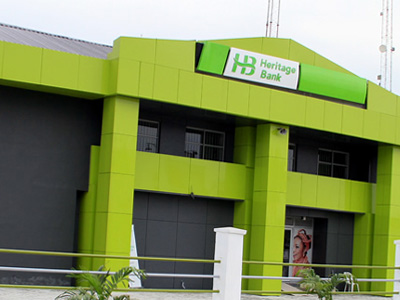While the Nigerian Deposit Insurance Corporation starts paying back depositors of the bank that failed, the Bank Customers Association of Nigeria has backed the Central Bank of Nigeria’s decision to revoke Heritage Bank’s license.
According to Dr. Uju Ogubunka, President of the Bank Customers Association of Nigeria, the decision made by the apex bank offered security to the banking industry. CBN declared on Monday that Heritage Bank’s license had been immediately terminated.
“This action has become necessary due to the bank’s breach of Section 12 (1) of BOFIA, 2020. The board and management of the bank have not been able to improve the bank’s financial performance, a situation which constitutes a threat to financial stability.
“This follows a period during which the CBN engaged with the bank and prescribed various supervisory steps intended to stem the decline. Regrettably, the bank has continued to suffer and has no reasonable prospects of recovery, thereby, making the revocation of the license the next necessary step,” part of the CBN statement read.
CBN went on to appoint the Nigeria Deposit Insurance Corporation as the liquidator of the bank in line with Section 12 (2) of BOFIA, 2020.
Ogubunka said, “The CBN cannot just take action without considering the implications. If a bank has been run aground, of course, it has implications for others. Other banks have dealings with it, and other institutions and individuals deal with the bank. So, if you put all of these together, that institution can jeopardise the system as a whole if the authorities do not take the necessary actions.
“The CBN would have considered the position of the bank; if irredeemable, for instance, from whatever status it is, can it be redeemed? Can it be acquired by another bank or merged with another bank, or can it be allowed to raise more money to shore up its capital and fulfil other obligations? If those questions are answered in the negative, the authorities will have no alternative. Instead of everybody being affected, let just one go and that is exactly what has happened.”
He noted that CBN would have arrived at the decision having engaged with the bank’s senior management and directors.
“They would have been asked to do one or two things they had been unable to do and the situation gets critical. The regulator would have no choice but to take the necessary steps within the law. Whatever CBN had done would be within the law and after several requests from those who are managers or directors of the bank to do certain things,” he asserted.
He added that while the CBN’s move was the right one, it would bring some inconvenience for bank customers, “especially those who have accounts with the bank and those who have relationships with the bank, even fellow bankers because the business is connected”.
“Bank customers, except those who are indebted to the bank, are the ones who will be bothered so much because they are the ones who are supposed to pay back some money to the bank, but if you have credit in your account, you just have to wait until NDIC takes over the bank, sees what is there and how they are going to repay those who have credit,” Ogubunka explained.
Professor of Capital Market, Uche Uwaleke, echoed similar sentiments, saying, “I think the revocation of the license of Heritage Bank by the CBN is a step in the right direction.
“This proactive step by the CBN is in the overall interest of financial system stability. With the NDIC taking over the liquidation process, efforts should be made to protect the depositors as well as the interests of employees using liquidation dividends.”
Meanwhile, the NDIC said that it had commenced the liquidation of the failed bank with immediate verification and payment of insured deposits to the bank depositors.
A statement signed by the NDIC Director of Communication & Public Affairs, Bashir Nuhu, on Monday, said, “Depositors of the bank that have an alternate account within the industry will be paid up to the insured amount of N5m per depositor using their Bank Verification Number to locate their alternate account. While depositors with funds in excess of N5m will be paid liquidation dividends upon realisation of the bank’s assets and recovery of debts owed to the bank.”
The corporation urged the bank’s creditors to visit the nearest branch of the bank to file their claims, or via the online platform.
It explained that the creditors would be paid after the depositors, adding that the failed bank’s debtors who were yet to complete the repayment of loans were advised to do so.
“The NDIC wishes to assure the entire banking public of its commitment to the continued safety of depositors’ funds in all licensed banks. As such, depositors are urged to continue their banking businesses without fear, as banks whose licences have not been revoked remain safe and sound,” the NDIC statement concluded.
Also, the House of Representatives has pledged its commitment to engage with relevant stakeholders, to ensure the safety of depositors’ funds with Heritage Bank.
In a statement issued by its spokesman, Akin Rotimi, the House said it was aware of the revocation of the licence of Heritage Bank and the appointment of the NDIC as the liquidator under the provisions of the Banks and Other Financial Institutions Act.
“We assure the public, particularly depositors and stakeholders of Heritage Bank, that the House is committed to carrying out its constitutional oversight functions to ensure that this development does not negatively impact Nigerians. The relevant House Committees on Banking Regulations and Insurance will be up to their duty, to thoroughly examine the circumstances surrounding this decision and the subsequent steps taken by the NDIC.
“Our priority is to safeguard the interests of all depositors and maintain the stability of the financial system. We will engage with the CBN, NDIC, and other relevant stakeholders to ensure a transparent and orderly resolution process, providing necessary support to mitigate any potential negative impact on the public.
“We urge the CBN and NDIC to establish clear channels of communication to allay the fears of the public and prevent any loss of trust in our financial system. Effective public engagement is crucial to maintaining confidence during this period,” the statement read in part.
The Chairman of the House Committee on Banking Regulations, Mohammed El-Rufai, stated, “The committee will closely monitor the liquidation process to ensure that the rights of depositors are protected and that the process adheres to the highest standards of transparency and accountability.”
Similarly, the Chairman of the Committee on Insurance and Actuarial Matters, Ahmed Jaha, said, “We will work diligently to oversee that the NDIC executes its mandate effectively, ensuring the protection of depositors’ funds and maintaining confidence in the financial sector. The NDIC Act and the Banks and Other Financial Institutions Act are clear in their provisions that depositors’ funds are insured and protected.”












